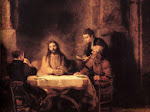The story picks up where "The Fellowship of the Rings" (the fist part) leaves off, at the breakup of the fellowship - that is where Frodo and Sam leave on their own to pursue the path towards destroying the ring of power, Boromir dies attempting to defend Merry and Pippin from the Orcs, the Orcs capture and steal away Merry and Pippin, under orders to capture alive a half-ling (another name for a hobbit), and Aragon, Gimli, and Leglolas, after sending Boromir down the river in a proper funeral boat, begin the chase on foot after Merry and Pippin to rescue them from the Orcs. (Gandalf the Grey apparently dies in the first part, but reappears in the second part transformed into Gandalf the White - a more powerful wizard.)
As the story develops through deep twists and turns, you find yourself deeply immersed in the world of
Middle Earth, which has a deep, profound, and long history, sometimes conveyed in conversations, but more reflected in the actions of the many characters, the vast geography they travel, and the variety of those who people middle earth. This is part of the draw which attracts many readers to read these stories again and again - some as often as once a year.
This part of the story revolves around two towers (as the title suggests) - the tower of Orthnac at Izengard ruled by Saruman, the White Wizard (who has turned traitor), and the tower of Barad-dur (which translates into English as the Dark Tower) where the Dark Lord Sauron rules from. These two loci of evil seek to rule Middle Earth, which the Dark Lord can easily do if he can obtain the ring of power which Frodo bears in order to destroy it, though he must do so in the land of Mordor which Sauron rules.
 |
| The Ents |
I especially enjoyed his imaginative creation of the Ents, living trees who guard, shephard, and protect the trees of the forest. They are so upset with Saruman's heedless destruction of the trees that they finally decide they must attack. They destroy Isengard and keep Saruman essentially locked up in his tower so he can no longer spread his evil in the region.
Later on, Frodo and Faramir, Boromir's brother, have a long, fascinating conversation which covers much of the history of Middle Earth. Most important to the plot development, Frodo spares Gollum's life from the hand of Faramir, much as his uncle did back in the original story, "The Hobbit." This will play an important role in the development of the story later on.
I again urge any who have not read these stories to do so. They stand as a great work of literature.
Part 1: The Fellowship of the Ring
The Fellowship of the Ring (Film)
The Lewis-Tolkien Friendship









